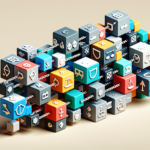Understanding RWA Tokenization
What are RWAs?
Real-world assets (RWAs) refer to physical or tangible items that hold intrinsic value and can be owned or exchanged. This category includes real estate, commodities, or even artworks. Traditionally, these assets are housed within centralized systems, such as banks and financial institutions, which act as intermediaries for transactions, ownership transfers, and evaluations.
What is Tokenization?
Tokenization is the process of converting ownership rights to an asset into a digital format on a blockchain. By representing these rights through tokens, the vast potential of blockchain technology can be harnessed. Tokenization transforms RWAs into digital tokens, which can be easily traded, managed, and diversified on blockchain platforms.
Benefits of RWA Tokenization
Enhanced Liquidity
One of the most significant advantages of tokenizing RWAs is the increase in liquidity. Traditional markets can be cumbersome, often slowing down transactions and making it difficult to buy or sell assets quickly. By converting these assets into tokens, they can be fractionally owned and traded on decentralized exchanges, thus attracting a wider array of investors and facilitating quicker transactions.
Increased Accessibility
Tokenization enables a broader audience to access investment opportunities. With RWAs, investing is often reserved for the wealthy or institutionally backed investors due to high entry costs. Tokenization allows multiple investors to own fractions of high-value assets, making participation in markets that were once off-limits to the average person more achievable.
Transparency and Security
Blockchain technology offers an immutable ledger, increasing trust in asset ownership and transaction history. By storing RWA ownership on the blockchain, the need for third-party verification decreases, reducing the risk of fraud and mismanagement. Investors can easily verify their asset ownership and its historical transactions, providing an extra layer of confidence.
Challenges in RWA Tokenization
Regulatory Concerns
Even though tokenization offers numerous benefits, it must operate within a legal framework that varies from country to country. Different jurisdictions have diverse regulations surrounding securities, assets, and cryptocurrencies. Navigating these regulations and ensuring compliance presents a significant challenge for businesses involved in RWA tokenization.
Valuation Difficulties
Valuing RWAs can be complex. Unlike publicly traded stocks that have clear market prices, valuing physical assets such as real estate or artwork can be subjective and may vary depending on several factors. Accurate valuation is crucial for tokenization; without it, investors may face losses or inflated expectations.
Technical Roadblocks
Integrating traditional systems with blockchain technology can be a hurdle. Existing financial institutions may resist adopting blockchain solutions due to established routines and legacy systems. Furthermore, the technology itself demands considerable expertise and can be subject to security vulnerabilities if not implemented correctly.
Real-World Applications of RWA Tokenization
Real Estate Tokenization
Investing in real estate has traditionally been an intricate process, often requiring substantial capital. Tokenization allows for fractional ownership, meaning investors can buy small portions of properties rather than the entire asset. Platforms like RealT enable users to invest in properties through tokenized real estate ownership, with rental income distributed as dividends.
Art and Collectibles
Art can often be a volatile and opaque investment. By tokenizing artwork, investors can purchase shares in valuable pieces without needing to buy the entire work. Platforms such as Myco offer the opportunity for investors to own a fraction of high-value art, democratizing access to a market typically dominated by affluent collectors.
Commodities and Agriculture
Tokenization can reshape how commodities are traded and accounted for. Farmers can tokenize their crops, allowing them to raise funds ahead of harvest time. This innovates traditional financing models, providing farmers access to liquidity without selling their assets prematurely. These tokens can also represent physical commodities traded globally, increasing market efficiency.
The Future of RWA Tokenization
Institutional Adoption
As awareness and understanding of blockchain technology grow, more institutional players are likely to adopt RWA tokenization. Legal frameworks will evolve to produce clearer guidelines, encouraging banks and large financial institutions to invest in this innovative approach.
Integration with DeFi
Decentralized finance (DeFi) is burgeoning alongside RWA tokenization. By integrating RWAs into DeFi platforms, there could be new opportunities for earning yields, lending against tokenized assets, or even leveraging them within liquidity pools. This promises to create a more interconnected financial ecosystem.
Sustainability and Social Impact
Tokenization can also play a significant role in sustainable investment. For example, it can help finance renewable energy projects or fund social enterprises by allowing investors to support projects that align with their values. By lowering barriers to investment, it makes impactful financial opportunities more accessible, potentially reshaping investment in sectors focused on societal good.
Globalization of Investment Opportunities
Tokenized assets can be traded globally without the restrictions that may come from traditional barriers. This globalization of investments opens markets for both investors and asset owners, facilitating a more inclusive and diverse financial environment.
The Role of Startups and Innovation in RWA Tokenization
Emerging Platforms and Solutions
As RWA tokenization takes off, numerous platforms are being developed to facilitate this transition. Startups are emerging with unique algorithms and models to make tokenization seamless and user-friendly, incorporating user feedback to build better services.
Collaboration with Traditional Finance
Traditionally conservative financial institutions may not be able to transition to tokenization on their own. Collaborations between startups in the tokenization space and established financial entities will likely lead to hybrid solutions that draw on the strengths of both worlds. This combination could streamline existing processes while incorporating the advantages of blockchain.
Educational Initiatives
Education will play a critical role in the widespread adoption of RWA tokenization. As both investors and traditional finance professionals become more knowledgeable about blockchain’s potential, the more likely they are to embrace this transformative technology. Companies that offer education and resources will be well-positioned to lead the market.
By understanding the nuances of RWA tokenization, we see its potent potential to reshape traditional finance. Real-world implications extend beyond just technology; they encompass an evolution in how we view ownership, investment accessibility, and the financial ecosystem as a whole.









